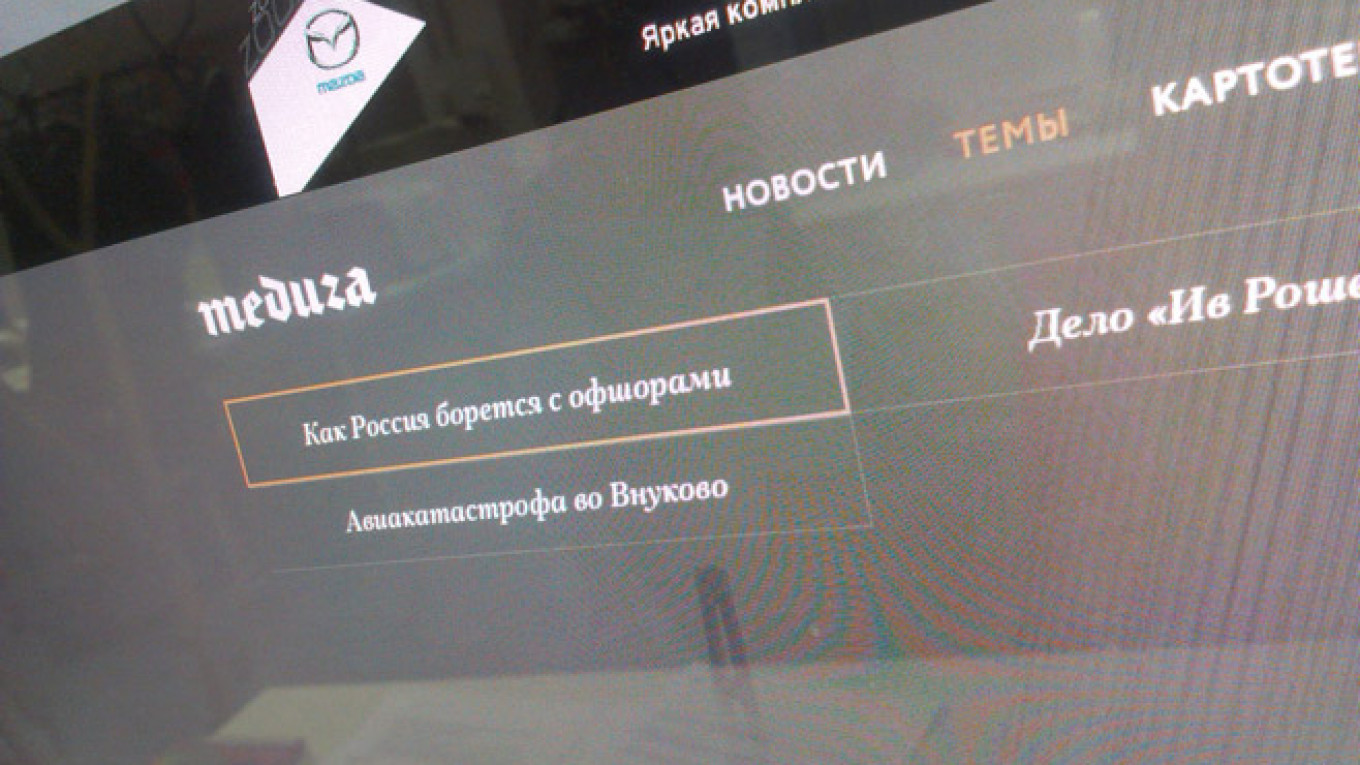Seven months ago, Lenta.ru was riding a wave of success as Russia's most-visited news website.
After a major site redesign and revamp of the newsroom, Lenta had become Russia's most popular online news outlet and one of the top five most popular news websites in Europe, according to web analytics firm Alexa.com.
The international Society for News Design named Lenta's slick new black-and-white look the world's best-designed website. The look was minimalist and classic, tailored to keep readers focused on the content.
And it was precisely the content that created problems for Lenta. In March, Russia's telecom watchdog Roskomnadzor issued it a formal warning after Lenta published an interview with Ukrainian nationalist leader Dmytro Yarosh. Another warning could have forced the media outlet to close.
On March 12, Lenta's owner — one of Russia's leading media magnates, Alexander Mamut — fired Lenta's editor-in-chief Galina Timchenko. The next day, 40 members of Lenta's newsroom submitted their resignation, and a day later 20 others followed suit. Alexei Goreslavsky, a former editor of pro-Kremlin news website Vzglyad.ru, replaced Timchenko.
Timchenko's dismissal provoked outrage among editors and journalists throughout the industry, which in recent years has become increasingly dominated by state-run media mammoths. The former editor of Afisha magazine, Ilya Krasilshchik, publicly advised aspiring journalists "to choose another profession."
"Today is not the right time," he wrote on Facebook at the time. But ultimately, he decided to give Russian journalism another go.
Escaping the Tentacles
Timchenko and Krasilshchik decided to move to the Latvian capital Riga, where on Monday, together with several dozen other Russian journalists, they unveiled Meduza (Russian for "jellyfish"), a news website that will be oriented toward Russian audiences but will operate outside the reach of the Russian state.
"It seems you have something to read again," one of Meduza's teasers said, without false modesty.
Meduza's editors claim to have enough expertise to choose the most important and relevant news about Russia from a myriad of online sources. Meduza also has several correspondents who will produce their own original stories. One of the first three features, about the future of pro-Russian separatism in Kazakhstan, has already created problems for Meduza: On Tuesday, a day after its launch, the website was blocked in the Central Asian country.
Meduza says it will attempt to circumvent government control of the Internet by relying on smartphone apps, which are more difficult to block.
In an interview with The Moscow Times, Timchenko described the move to Riga as a "forced measure" that was the result of suffocating working conditions in Russia.
"It would be much better to work from Moscow," she said.
In Timchenko's words, the website will offer its readers an "accurate and complete picture of what is happening in Russia."
After Meduza's launch this week, Leonid Bershidsky, founding editor of the Vedomosti business daily and a raft of other respected Russian publications, said he "sees no point in doing what they are doing."
"The sources from which they take material are obvious. The rewrites are rudimentary and unnecessary, the original reporting not particularly topical or surprising," he told The Moscow Times in written comments.
"I don't want to speculate on their chances of success, whatever that word might mean. If needed to pick one word for it, though, it would be 'boring,'" he said.
Safe From Harm
Meduza's deputy editor Ivan Kolpakov said the website is attempting to create "the best newsroom" it can, considering the circumstances.
"We are trying to make a publication that provides a meaningful and clear picture of events in Russia and the world," Kolpakov told The Moscow Times.
"Our motivation is simple: We have nowhere else to work," he said.
None of the Meduza journalists was thrilled about moving to Riga, he said, adding that they would be prepared to return to Moscow.
"There is only one condition: that our newsroom would be safe, including physically safe," Kolpakov said.
In several interviews with Russian news outlets, Timchenko refused to reveal Meduza's investors. Former oil tycoon-turned-opposition figurehead Mikhail Khodorkovsky offered to contribute, but the sides did not agree on the "management principles," she told Forbes last month.
According to Bershidsky, concealing the identity of investors "would be troubling if this was a real news outlet doing a lot of its own reporting" instead of being primarily a news aggregator.
"I don't see how it's possible to undermine the credibility of an aggregator. It's spread out, as it were, among the sources of the original material," he said.
Contact the author at [email protected]
A Message from The Moscow Times:
Dear readers,
We are facing unprecedented challenges. Russia's Prosecutor General's Office has designated The Moscow Times as an "undesirable" organization, criminalizing our work and putting our staff at risk of prosecution. This follows our earlier unjust labeling as a "foreign agent."
These actions are direct attempts to silence independent journalism in Russia. The authorities claim our work "discredits the decisions of the Russian leadership." We see things differently: we strive to provide accurate, unbiased reporting on Russia.
We, the journalists of The Moscow Times, refuse to be silenced. But to continue our work, we need your help.
Your support, no matter how small, makes a world of difference. If you can, please support us monthly starting from just $2. It's quick to set up, and every contribution makes a significant impact.
By supporting The Moscow Times, you're defending open, independent journalism in the face of repression. Thank you for standing with us.
Remind me later.






